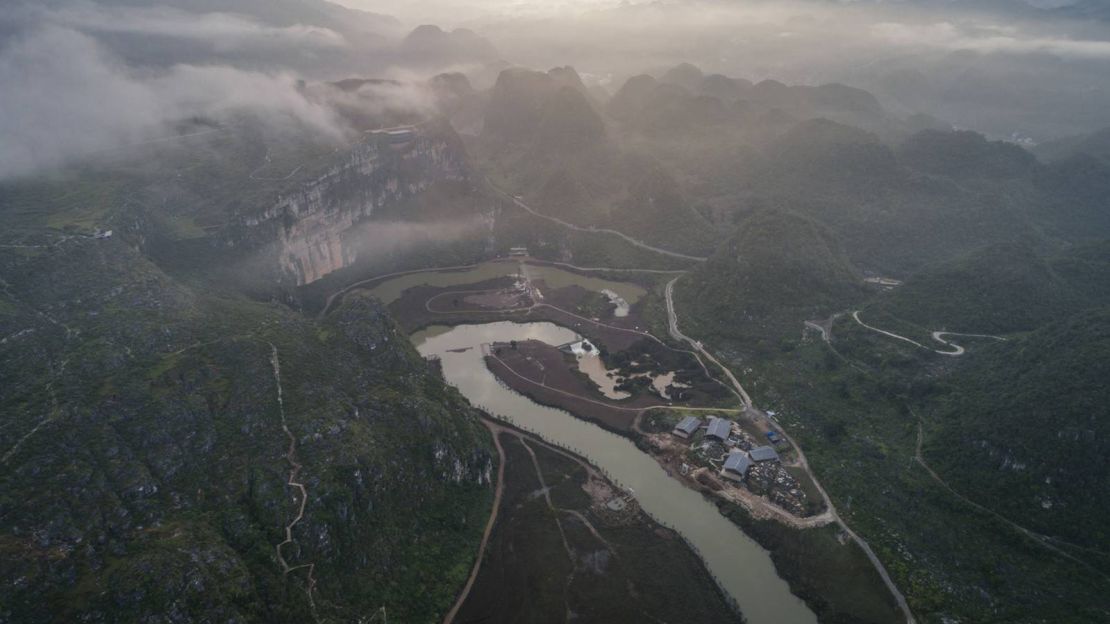“When I visited Anlong County for the first time, I hiked up a small hill and in front of me stood a cliff over 100 meters high,” recalls He Wei, a Beijing-based architect.
“At the bottom of the cliff lay a lush pocket-shaped canyon with a river meandering from afar and disappearing to the sinkholes. I thought to myself then, ‘This place is too beautiful.’ ”
He, with his architecture firm 3andwich Design Studio, is behind the design and construction of the stunning Anlong Limestone Resort Tourist Center and Limestone Gallery, the only two man-made buildings inside the Anlong Limestone Resort in Guizhou, China.
China’s first national outdoor sports park

Known for its karst landscapes and a 50-hectare canyon, the five-square-kilometer Anlong Limestone Resort is China’s first national outdoor extreme sports park.
Opened in 2016 with an investment of $42 million from the government, it’s hosted various national and international sports events. it offers access to several extreme sports activities including rock climbing, paragliding, cave exploration, kayaking, mountain biking and hiking.
There’s also a via ferrata on the side of a 165-meter-high cliffside, offering breathtaking views of the Haiwei Canyon. The Anlong Limestone Resort Tourist Center sits at the bottom of that canyon.
“The visitor center is located on a small hill,” says He. “On the hill sits four groups of rocks. The shapes of the rocks are wonderful and they’re an important treasure endowed by nature to the site.
“Our design hopes to keep the rocks at the original site as much as possible by interspersing the buildings between the rocks. The rocks are both the foundations of the buildings and an important feature in the views from the buildings.”
The visitor center has a welcome area, a bar, a restaurant and a conference room in the complex. An elevated outdoor platform, where travelers and locals can mingle, connects the four buildings.
“Architecture serves as a link between nature and people,” says He.
“We hope that the visitor center will maintain a symbiotic relationship with nature. It serves as an anchor as well as a spiritual beacon of the entire site. Architecture should integrate into nature but also wake up nature.”
Anlong’s hidden, floating gallery
Guizhou's beautiful Limestone Gallery
Located near the end of the via ferrata is another park highlight – Limestone Gallery.
Hidden in a natural indentation atop the 165-meter-high cliff, the glass-fa?ade gallery provides indoor exhibition space and a viewing rooftop overlooking the entire canyon.
Why build an art gallery in the middle of a sports park?
“Originally the owner hoped to build a viewing platform here for people to see the canyon,” says He.
“Our designers thought that an outdoor viewing platform is a weak and common concept for views like this. It only satisfies the basic functions but doesn’t add value to the project.”
The asymmetric and curved gallery is designed to fill up the missing part of the cliff and mesh with nature.
“On sunny days, the glass surface can reflect the surrounding mountains and the sky; when the sky is cloudy, the glass’s gray color is integrated with the cliff wall,” says He.
An untouched tourism gem
Anlong Limestone Resort is part of a series of projects carried out by the local Guizhou government to develop the economy and attract tourists to this otherwise under-developed part of China.
Situated inside the Qianxinan Buyei and Miao Autonomous Prefecture, Anlong – besides its dramatic landscape – boasts a rich and distinct indigenous culture. Minority groups make up almost half of the county’s population.
The local government has also been renovating old temples and towns to kick-start tourism in the area, while more hotels are being planned.
“Anlong’s resources are still in a relatively primitive and untouched state,” says He, who recently led a field trip to the region with Chinese arts students.
In addition to the Anlong Limestone Resort, He recommends visiting Wanfenglin and Maling River Grand Canyons, the sinkholes and the 17-kilometer-long Rhino Caves around the park.
Apart from the rainy season, which lasts from July to September, the climate is mild all year round.
“After the project was completed, I returned to Anlong many times,” says He.
“It’s been a very moving experience to witness the changes of the park. It was an unknown place but thanks to the opening of the resort, the canyon is now alive with activities. It’s become a weekend destination for tourists and locals alike.
“When I see tourists resting at the visitor center or locals looking out from the gallery, it gives me a sense of achievement as an architect.”

















